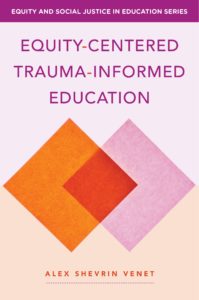Trauma-Informed Schools to Support All Students
Equity-Centered Trauma-Informed Education
By Alex Shevrin Venet
(W.W. Norton & Company, 2021 – Learn more)
Reviewed by Bill Ivey

As we struggled to respond personally and professionally to the shock of the pandemic and adjust to “a new normal,” the murder of George Floyd reminded us of the deep injustices in the old normal and brought racism to a new level of national consciousness – even as it inflicted additional trauma on Black, indigenous, and other people of color.
Many schools responded with efforts to support our students through these multiple and ongoing sources of trauma and to take our social justice work to new levels.

In this context (though originally conceived and begun pre-pandemic), Alex Shevrin Venet’s Equity-Centered Trauma-Informed Education is the perfect book for our times (and beyond).
The power of trauma-informed practices
The book’s central theme is to “highlight the power of trauma-informed practices to guide our journey toward more equitable and just schools while also cautioning against potential missteps that may sidetrack or weaken our work.” (p. xviii)
Venet begins by defining and reflecting on “trauma-informed education” and “equity,” and divides the rest of her book into four additional parts, each representing the four shifts she suggests making: adopt a universal approach, rethink your role as an educator, move from mindset to systems change, and change the world from inside your classroom.
Each chapter concludes with suggested action steps, often focusing on how to further develop our lens, transform our classroom, and shift the systems.
Trauma-informed educational practices respond to the impact of trauma on the entire school community and prevent further trauma from occurring. Equity and social justice are key concerns of trauma-informed educators as we make changes in our individual practice, in classrooms, in school, and in district-wide and state-wide systems. (p.10)
Educational equity is the process of ensuring that all students can access high-quality education, that they are fully included in their school communities, that they are able to engage in meaning and challenging academic work, and that they can do all of this in an environment that values them as people. (p.22)
In putting these principles into action, Venet explains, we implicitly and explicitly recognize that students bring their whole selves to our classrooms – that “trauma is a lens, not a label” (p. 43), that being proactive serves students better than being reactive, and that trauma-informed practices are in fact good for all students.
By working to actively prioritize predictability, flexibility, empowerment, and connection (pp. 68-69) in our practices and policies, in our classrooms and schools, we can work to create and strengthen the kinds of safe spaces and communities that allow us not only to prevent, identify, and when needed seek to repair trauma but also to create joy and resilience, to engage in (as the title of Chapter 13 says) “activism and action as healing.”
Finding your place on the continuum, then acting
In reading this book, different teachers will see themselves and their practices, and the practices and policies of their schools, in different ways. And we will all find that Venet has written her book not only to inform us but also to call us, gently but firmly, to reflect and take action.
Where we see that our work genuinely supports students – and indeed all members of our school communities – in their full humanity, we may affirm the value of what we do. Where we may, however unintentionally, be doing harm, we can do everything in our power to cease those practices. And where we see opportunities for growth, we can seize them.
As Alex Shevrin Venet says in her conclusion, “I’m glad to be on the journey with you. Let’s get started.” (p.194)
Read Venet’s MiddleWeb article “Trauma and Teaching: Boundaries and Bridges” here.
Bill Ivey is Middle School Dean and teaches Humanities 7, Rock Band, and French 1 at Stoneleigh-Burnham School, an independent gender-inclusive girls school in Western Massachusetts for boarding and day students, grades 7-12. See Bill’s other MiddleWeb reviews and articles here.






























